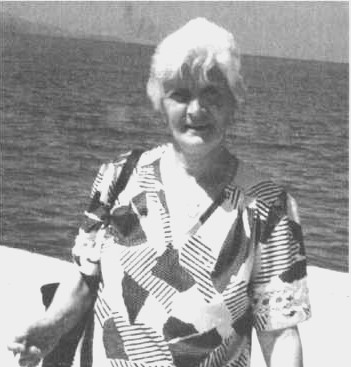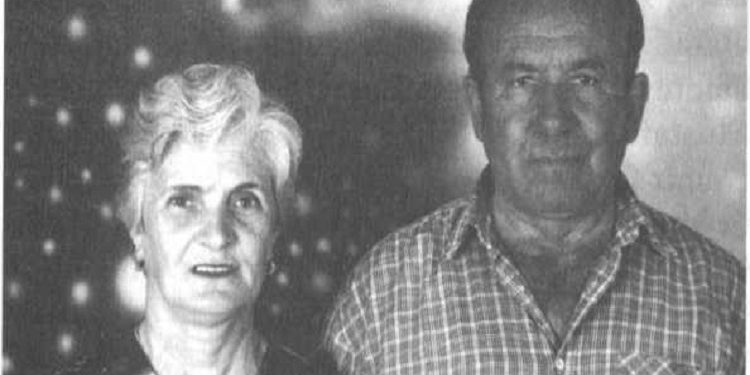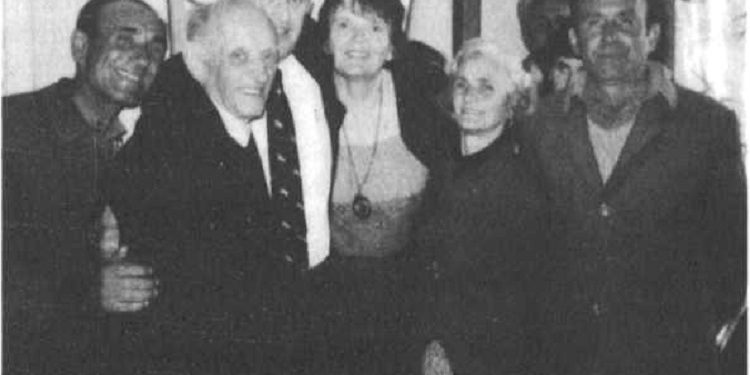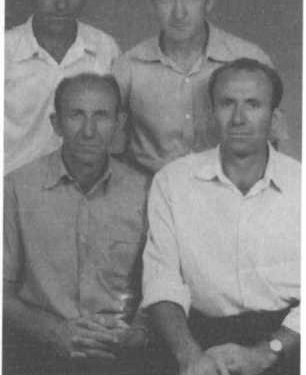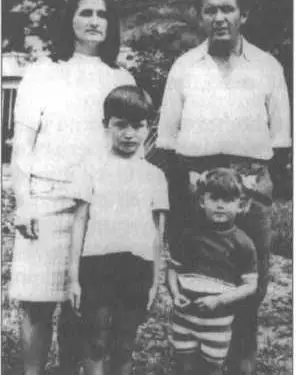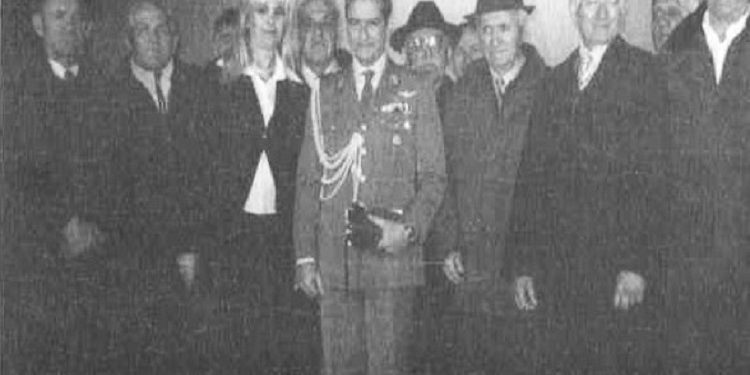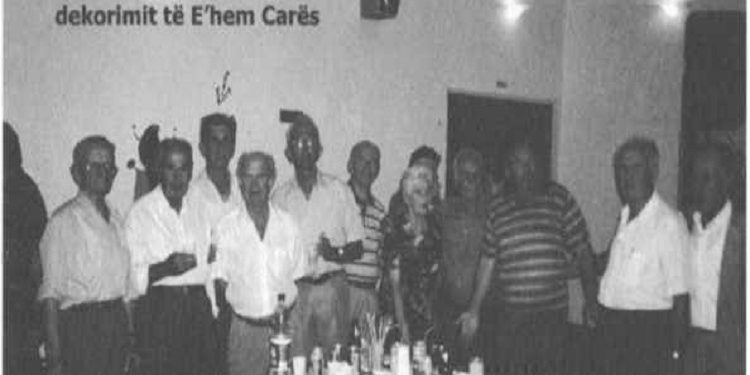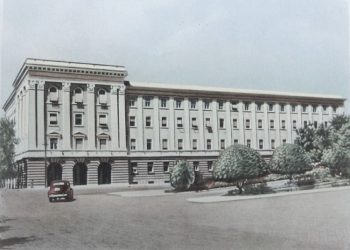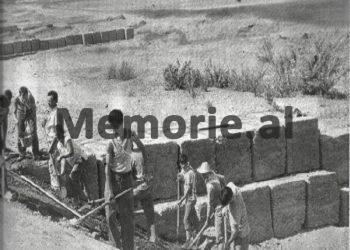By Sofika Prifti Cara’s
Part Ten
To Forgive…!)
Memorie.al publishes excerpts from the book ‘To Forgive’, authored by Mrs. Sofika Prifti (Cara), published by the Institute for the Study of Communist Crimes and Consequences in Tirana, in which the author has described with detail and professional competence the history of one of the most well-known families, not only in the city of Kavajë but also beyond – the Cara clan. This family produced not only distinguished patriots who contributed to the national cause and the freedom of Albania, but also renowned intellectuals, graduated in the West, who later returned to the homeland, contributing in various fields of science and life. However, even though the descendants of the Cara clan dedicated their lives to the national cause, after the communists came to power at the end of 1944, they would be persecuted, imprisoned, and interned, and the fierce class warfare would follow them until 1990, when the collapse of the communist regime began.
Continues from the previous issue
MY MOTHER’S DEATH
The date March 8, 1978, will remain unforgettable for me. I remember that at the time I was hospitalized and was due to undergo surgery the next day. The hospital cook was my mother’s neighbor, and every day I would ask her how my mother was doing. My poor mother had been discharged from the hospital a week earlier, suffering from azotemia. On the morning of March 8, the cook came and told me: “Sofi, your mother seemed a little better today, and she gave me these for you with her own hand…”! She had brought a handkerchief and some small items, which were the first and last things after 17 years of not speaking to one another. However, just as the cook had left, at 6:30 in the morning, my mother had passed away, with these words on her lips: “The earth won’t dissolve me for Sofija…”! We had spent 17 years apart, not speaking to each other because of the dreadful “class warfare.” A friend of my younger brother came, shook my hand, and consoled me with the words; “May you live long, Sofi! Your mother left us.” His name was Petraq Gjini. “The funeral will be at 4 in the afternoon,” he said. “She died with your name on her lips and left a final wish for you to throw three handfuls of soil and forgive her”!
I left the hospital and went to bury my mother, with whom I had not met for 17 years. I went and saw her for the last time, but not alive, with that face yellow as a quince. I kissed her, and it felt as if I was kissing a piece of ice! Usually, at the graveyard, people shake your hand to offer condolences, but no one offered me their hand; they looked at me with pity and boarded the bus. I stayed a little longer at my mother’s grave, wept for our bad fate, then got up and left. My brother, Petraqi, was waiting for me there, watching me with great sorrow. It was the class warfare, like a trench between us, and we were afraid of each other. I was afflicted by the “leprosy” of class warfare.
My mother died and was buried within the day, and my soul knew how painfully I felt her absence. My life was melting like a candle. Whoever endured that murderous system through persecution, I say they are the cream of society. They are the layer with a generous, forgiving, and non-vengeful soul. I always thought at night when I couldn’t sleep: will I, too, ever see the light of day? Today, I often think about those years, that life, which had become like a patched garment, patch upon patch, like a rag quilt. In our family, we had a mountain of punishments: one escapee, 23 years of prison, 17 years of internment, and two people who were going to be executed without trial in 1988!
I wished for those people who harmed us, not much, but just five years to experience our sufferings from that hated regime, which, like the moth that eats wood and clothes, ate away our hearts in our youth. That heart which was white and pure, because our heart always worked with sterile blood, which is why we remained strong and undefeated. Some of the leaders of that party, who were later called “enemies,” experienced misfortune themselves, and with their children, but not like us. Their children were educated not only here but also abroad, they saw the world, while we saw separation from our loved ones and tears that never dried. Today they are back in good jobs and everywhere, because they call themselves “political persecuted,” so they benefit more than we do, as they have education, money, etc.
Mothers’ hearts burn with fire for their children; mothers even give their lives for their children, but my relatives meeting me would endanger the entire family because they had good jobs! A full 17 years without meeting my mother! The final separation was amidst pain and a kiss, given by trembling lips, on the cold cheek and forehead, like ice, as well as my tears, which fell like dense raindrops, onto the coffin. This happened just a few seconds before she was put into the grave. My poor mother, who experienced separation from her daughter while alive! There is no one like mothers in the world!
THE PARASITE
In 1982, Bardhi was released from prison and began looking for work. When he was released, we both thought our troubles were over, but we were very wrong, because our troubles grew bigger. Bardhi had a stenosis of the heart and had a medical report for light work from the prison. He looked for work at the People’s Council of the neighborhood, but there they gave him jobs in agriculture and construction! He would take the work order and go where they sent him, but they wouldn’t accept him because of the report, and so he remained unemployed for a long time. One day he was called to the neighborhood Council and they told him: “Bardhi, we called you to inform you that if you don’t start work, you will be sentenced to three years in prison, as a ‘parasite’ of society”!
Bardhi told them: “But I desperately need work, because I have nothing to eat. I have come here to you every evening and asked for work, and I have gone where you sent me. It is up to you to find me work.” They asked him to renew the report. He went to the heart doctor, Liri Bele, to get the new report, but she told him: “This time you must get the report from the Superior Commission in Tirana.” On the day of the commission, Bardhi went to Tirana with his card and a sealed envelope. The chairman of the commission was again Ylli Popa (at the time). For us, there was only the white coat, and the rest was the system’s fear of holding the position it had. He opened the envelope, read the letter the doctor had sent, and acted according to the letters.
In medicine, there are also humane people who honor the white coat, because they have made it their duty to always work with conscience and justice, correctly diagnosing diseases through machines and analyses. One of these was the doctor Sokol Myftiu, who shut the mouth of the chairman of the superior commission with the heart machine results. Because of this, the commission unanimously said that Bardhi deserved the report, and they even advised him to have an operation. The report from the superior commission saved Bardhi from three certain years in prison. The police were eagerly waiting for him to come home, just to put the handcuffs on him again! Having that report, Bardhi was sent to work at the Economic Directorate of Education, where he did various external jobs with a foreman. However, before completing a year at that job, they fired him again, because they remembered that this institution was important, it contained documents and the “works” of Enver Hoxha.
They held a Party meeting and decided to fire Bardhi! The manager Pasho Abazi, opposed this decision and said: “Why are you firing him? He works outside, with plaster and bricks, loading and unloading; he doesn’t move from his workplace at all, we see him, he is regular, he has been here for a year, he doesn’t harm anyone.” The Party secretary, Miço Toska, along with some others, still took the decision to dismiss him. Bardhi filed a lawsuit and sued them in Fier, and he won. The enterprise filed an objection to the Supreme Court. The Chairman was Aranit Çela, who ruled in favor of the enterprise and sent the answer to Bardhi: “Due to the letter Ç, you are not allowed to work there!” Later, Bardhi was sent to the ‘Rruga-Ura’ enterprise, the place where they had arrested him before.
THE THIRD AND FOURTH ACCUSATIONS
One morning they came and informed Bardhi that he had to go to the ‘Red Corner’ of the Wood Processing Enterprise, because there was a meeting, and the hall there was large. The manager of that enterprise was the chairman of our neighborhood Council, Fejzi Hoxha. The meeting was held behind closed doors, by invitation, without the presence of family members. The topic of the meeting was: Bardhi!!! There, his activities and feelings were spoken of with the language of the viper; they had prepared 2-3 informers, one of whom was Viktor Deliu, who lived in the same neighborhood as us, but not that close. Viktor fabricated all sorts of things about Bardhi and spoke as the “masters” had taught him, those who had us as a thorn in their side. Since he was released from prison, Bardhi wouldn’t speak to anyone, because he had been “burned” once, with 15 years in prison.
But Viktor accused him: “Bardhi has cursed Comrade Enver, he is an American agent, and he has ties with Mehmet Shehu and Kadri Hazbiu.” (Both were dead at the time!) When Bardhi was sentenced to 15 years in prison, they were in power, which sentenced him at the age of 29, leaving him with only 7 years of schooling, and paying for it with his youth. The meeting lasted two hours, and in the end, Bardhi was placed under house arrest! This was the third accusation. Not long after, in May ’87, we were informed that there would be a neighborhood meeting for two “dangerous enemies”! We never thought that those two “enemies” were in our house, although the heart senses bad things. “Oh my, who are those poor people? Woe to them, for the black fate that awaits them!”- the people said.
The Council’s duty officer came again and said: “Bardhi and Xhevdet must not be absent, especially!” Everyone at home was stunned, shaken; the shadow of death fell on our faces, not yellow, but black, like the bottom of the cauldron with which we boiled clothes over the fire. The meeting was held with loudspeakers! This was the fourth time for Bardhi and the first for Xhevdet! My brother-in-law was slightly dark-skinned, and when he heard his name, a black shadow fell on him, like a moonless winter night. Both were accused “as enemies, because they were extremely dangerous.”
The officers and personnel chiefs were the “orators” prepared to speak, without knowing Xhevdet at all, while Bardhi had been their target before. No one from the neighborhood spoke, they only looked at us with great pity. Strangely, from that day on, people began to greet us without fear, coming for coffee and giving us courage. In conclusion, both brothers were released, pending a second decision from above.
A strict order was given that the two should not leave the city without permission from the Department of Internal Affairs. After the meeting, we returned home, but that night we did not sleep at all, we couldn’t rest. The final measure was: “Do not even step outside the gate!” Our house was on the side of the road, and Bardhi and Xhevdet made a decision; they got up early, went out into the street, found a car, and left for Tirana! That day there was a public reception for complaints at the Central Committee. At 8 in the morning, a policeman came to our house and asked for both of them: “At 10 o’clock, Bardhi and Xhevdet must report to the Department!”
The vigilance was great; the spies had brought the information to the Department of Internal Affairs. At the Central Committee of the PPSh, the secretary of Ramiz Alia was waiting, a certain Zalo Guga, who had a mark on his forehead. He was a decent man, with rare reasoning, judicious for many fellow sufferers like us. After hearing the two brothers, he gave them some advice and called the First Secretary of the Fier Party Committee, Pali Miska. Zalo Guga asked the secretary: “What information do you have about the Cara family?”
Surprisingly, he replied: “I don’t know anything about this family. The Department of Internal Affairs and the Front deal with these things.” The two brothers returned to Fier, somewhat relieved. In the Department of Internal Affairs, the chief operative was a certain Luçi Çala, whose duty was only to do harm. Ramiz Alia’s secretary sent the two outside to wait. He spoke on the phone with someone, but the two did not hear what he said. Then he called them back in and told Bardhi and Xhevdet:
“Go and continue your work, they will not bother you anymore, continue with this behavior you have and do not forget my advice!” Due to poverty, there was a lot of theft at that time! They were ordinary thefts: chickens, vegetables from the garden, fruit, and clothes hung on wires. The only house that never experienced theft was ours. This happened not because the thieves felt sorry for us, but because the guards were vigilant day and night, following us everywhere, like hyenas, which are sneaky animals. And the guards were not just men, there were women too…! In 2002, we met one of those officers, from the villages of Gjirokastër, who had spoken ill of Bardhi in the neighborhood trial, expressing the opinion that measures should also be taken against Bardhi’s family. This happened many years later, in Kavajë, at a death that occurred in our apartment building. He was a neighbor of the deceased, and we were family. As soon as he saw us, he spoke first:
“Where are you from? Are you from the Caras of Fier?”
“You are not wrong,” I said composedly, “we are from the Caras of Kavajë, and we previously lived in Fier. Why are you asking us? You haven’t forgotten us at all, even though many years have passed. We lived in the same city together, but not in the same neighborhood. At that time, you didn’t know us, so why did you propose to punish us as a family in the neighborhood meeting?! You spoke ill of Bardhi once, that wasn’t enough, but in the other meeting, you spoke ill of Bardhi and Xhevdet again! Since you didn’t know us at all, what prompted you to step up there?” His cousin, hearing these words, turned to him in shame:
“What have you done to us? We have been here in Kavajë for so many years; these people are like family to me, very good people.” He almost said to him: “you must have been a spy!” And the former Party officer said: “I apologize profusely, I swear, I was forced to. I truly did not know you at all, but I was worried about my job, for fear of losing it…! But, nonetheless, I lost it and became a bad person. I was an officer! Forgive me! Please, forgive me!” These were the “witnesses” of the Labor Party, who condemned innocent people!
MY FATHER’S DEATH
As I wrote above, the earth does not even dissolve a final wish. On March 15, 1985, my father also died. My parents had left a living will: to be placed together, in one grave. My father, Petro, was a good, noble, extremely gentle, kind, and honest man. I say he had these qualities not because he was my father, but he was truly like that, and for these qualities, he was respected in Fier. If he saw a false dream about me, he would come and wait for me at a small road I walked, even though he couldn’t escape the eyes of the spies. Tears were welling up in his eyes, like buttons. I always told him to calm him down: “Father, why are you crying, I’m fine, you see! Men don’t cry!” He remembered the day he had seen me talking to myself and taking the road to Tirana, to go to the Committee! As a child, and even as an adult, I would say to my poor mother when she asked me: “Who do you love more of the two of us?”
“I love father more!” How wrong I was not to tell my mother “I love you both equally!” Time, it seems, “punished” me, because my children also said that they loved their father more than me. The street where I was born had very old neighbors, and we got along in harmony. Later, a type came to us from the Seman estuary, which entered swaggering, a negative person, named Gori Vidhi, a real mobster! Only the fence separated us, and at first we got along well with him. His wife was not a girl from that house; others had raised her out of pity, because her parents had died. That man pretended to feel sorry for us. He worked in an enterprise with my younger brother, Pavllo.
Every time this monster saw me meeting my father, a meeting was held at the enterprise for my brother, accusing him of talking to an enemy, of having ties with the enemies of the party, etc. Pavllo would object, saying he hadn’t met me, but they never believed him. Gori was the trusted one! He was a nurse, and because of the evil he did, once a girl threw acid in his eyes to blind him, but evil people are never affected! I had not spoken to Pavllo for 25 years! My father got sick and was hospitalized for a week, but I didn’t know. He asked Pavllo to inform me; he wanted me to be at his funeral when he died.
“Go call her,” my father insisted, “she must come to the hospital!” Pavllo gave his word, and in the morning, he finally came to my workplace. After 25 years, I met my younger brother! That minute was very moving; tears flowed like streams of rain. So many people who were nearby stood as if frozen, and tears did not cease, when they saw that scene of the embrace, brother and sister, after a quarter of a century! My brother told me with tears in his eyes that my father was hospitalized and was asking for me. I was shaken. As soon as I left work, I went to the hospital, to my father.
He was eagerly waiting for me, and as soon as he saw me, he began to cry. When I saw how sick he was, I also cried with sobs, my tears did not stop and formed lines on my cheeks. My father, throughout those days, grew worse, speaking with difficulty. He said in a low voice to Pavllo:
“Pavllo! Are you speaking to Sofija?”
“Yes, Father!” he replied. “I informed her about you.”
“Then hug your sister, so I can see it with my own eyes!” the old man spoke with difficulty, his face brightening. The two of us hugged, brother and sister, and my father calmed down. Ah, what a bad time had come, a vile time! Oh, merciless time that did not hesitate to separate parents from children, brother from sister! It couldn’t get any worse than this! My father said to Pavllo:
“Give her our house key, so she can fix it up!” As if he knew these were the last days of his life. Pavllo was unmarried, my mother had died seven years earlier, and a heavy burden had fallen on Olimbi, my sister, from the time my mother fell ill and onwards. She was not only working eight hours a day, but she also had to take care of the family, her husband and three children, her father, and her brother. So my sister was very exhausted, because I was not entering that house at all.
After 25 years of separation, I opened the door and felt the sweet smell of the house where I was born! I rolled up my sleeves, cleaned, washed, and put everything in its place. Pavllo worked during the day, and at night, he stayed with our father in the hospital. It was March 14, turning into March 15, 1985, when I told my brother: “Pavllo, tonight I will stay with our father in the hospital.” Although he was tired, he objected and said he would stay himself; but my father nodded, half-heartedly, as if to say: “Let Sofija stay!” I hadn’t stayed a night with my father for 25 years; that was the first and last night we stayed together.
In the morning, Pavllo came quickly and told me: “You leave now, because your work is far away, and you will be late!” That night will remain unforgettable for me; I noticed that my father really wanted to talk to me, he stroked my hair, my hands were not separated from his throughout the night, and the tears did not stop. When I was leaving in the morning, I hugged him and kissed him hard with much sorrow. He held my hands tightly, with the last strength he had left. I kissed him again and he kissed my hand, and he wouldn’t let go of it. I, poor me, did not understand what he wanted to tell me and, after kissing him again, I said:
“Father, tonight we will be together again, I will go get permission at work, and I will come!” When we parted, a few drops of tears slipped down his cheeks; I wiped them away, but he hardly let go of my hand, then pulled it back, as if he wanted to tell me: “Don’t go, Sofi, I only have 20-30 more minutes of life left! Don’t go…”! His voice was deep and barely audible. Oh God! How did I not understand that look, those hand squeezes, to stay a little longer with my father! And I went to work. But my mind was preoccupied with the scene that was playing out before my eyes: the father I left in that condition! As soon as I arrived at work, I asked the storekeeper to give me the usual leave, because my father was very sick. He told me with regret:
“You go to the hospital and take care of your father; we will arrange the rest here!” The fatal minutes had flown, and as I was leaving the outer gate of my work, they gave me the sad news: my father had died ten minutes after I left! Ah, I cried inside, that’s why he was squeezing my hand, so I wouldn’t leave! How had I not understood?!
I mourned and buried my father. People looked at me with pity; this time they shook my hand, they comforted me, but very coldly. As I wrote above, I fulfilled their wish to be buried together. But a strange thing happened to us: Seven years had passed since my mother’s death, but when we opened her grave to bury my father there, her body was found perfectly preserved! Then I remembered her last words: “The earth won’t dissolve me for Sofija”! And truly, the earth had not dissolved her!
On March 15, 1985, my father also left me. But it seemed to me that he was still alive, giving me courage, comforting me, giving me strength, supporting me, always coming out to meet me. If he saw a false dream, he would rush to meet me. Sofi, he would say to me, with his beautiful eyes, I love you very much, I am proud of you! Memorie.al




